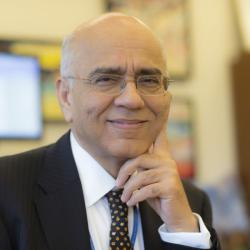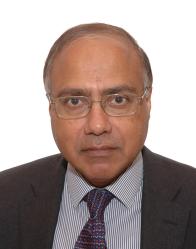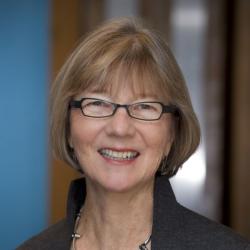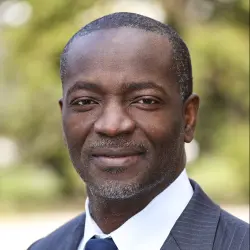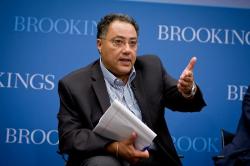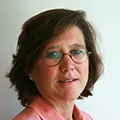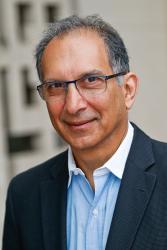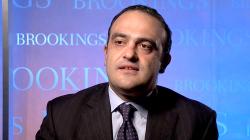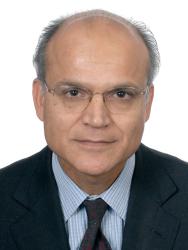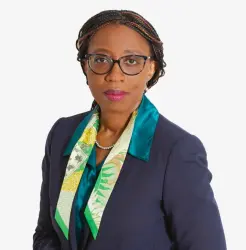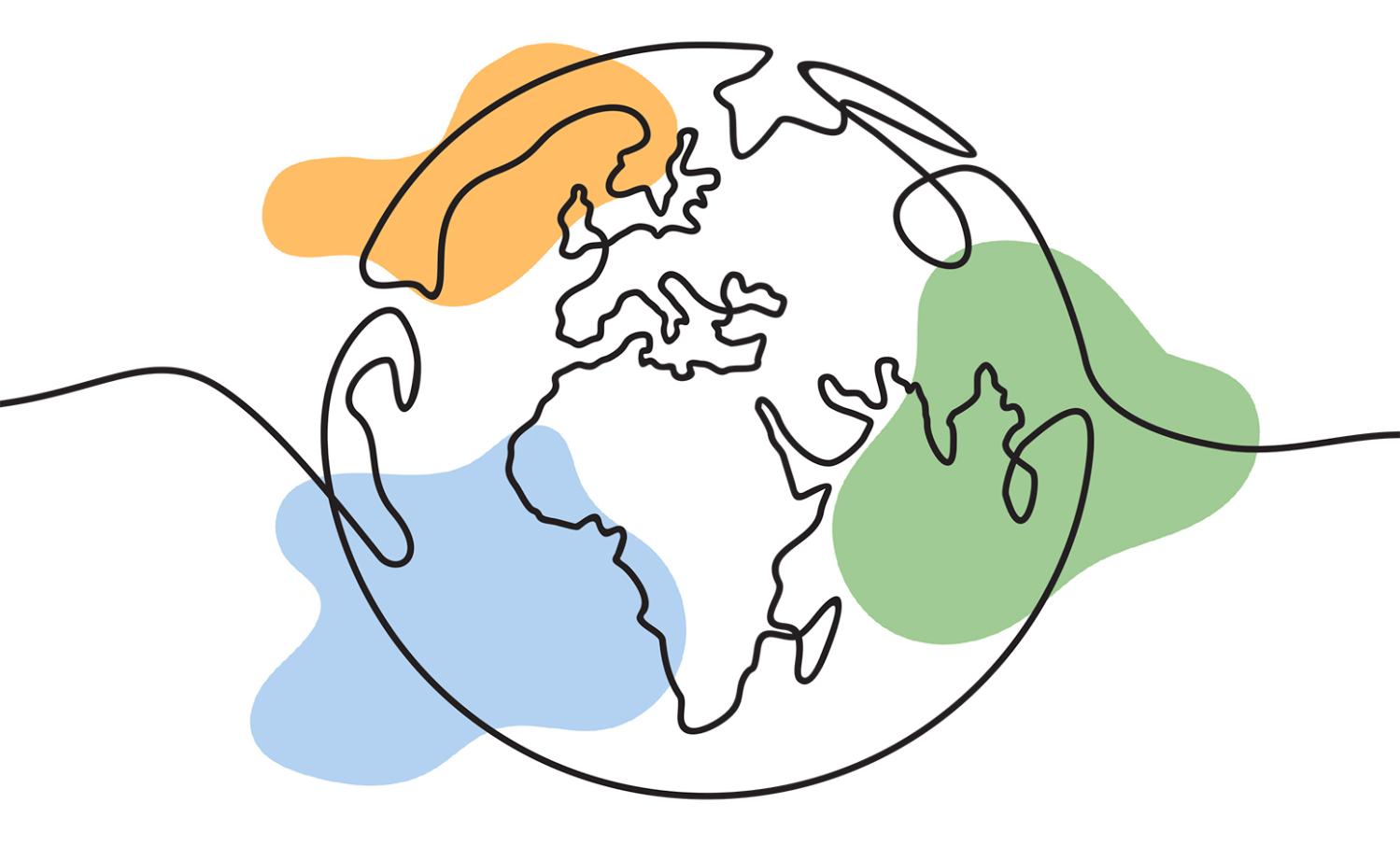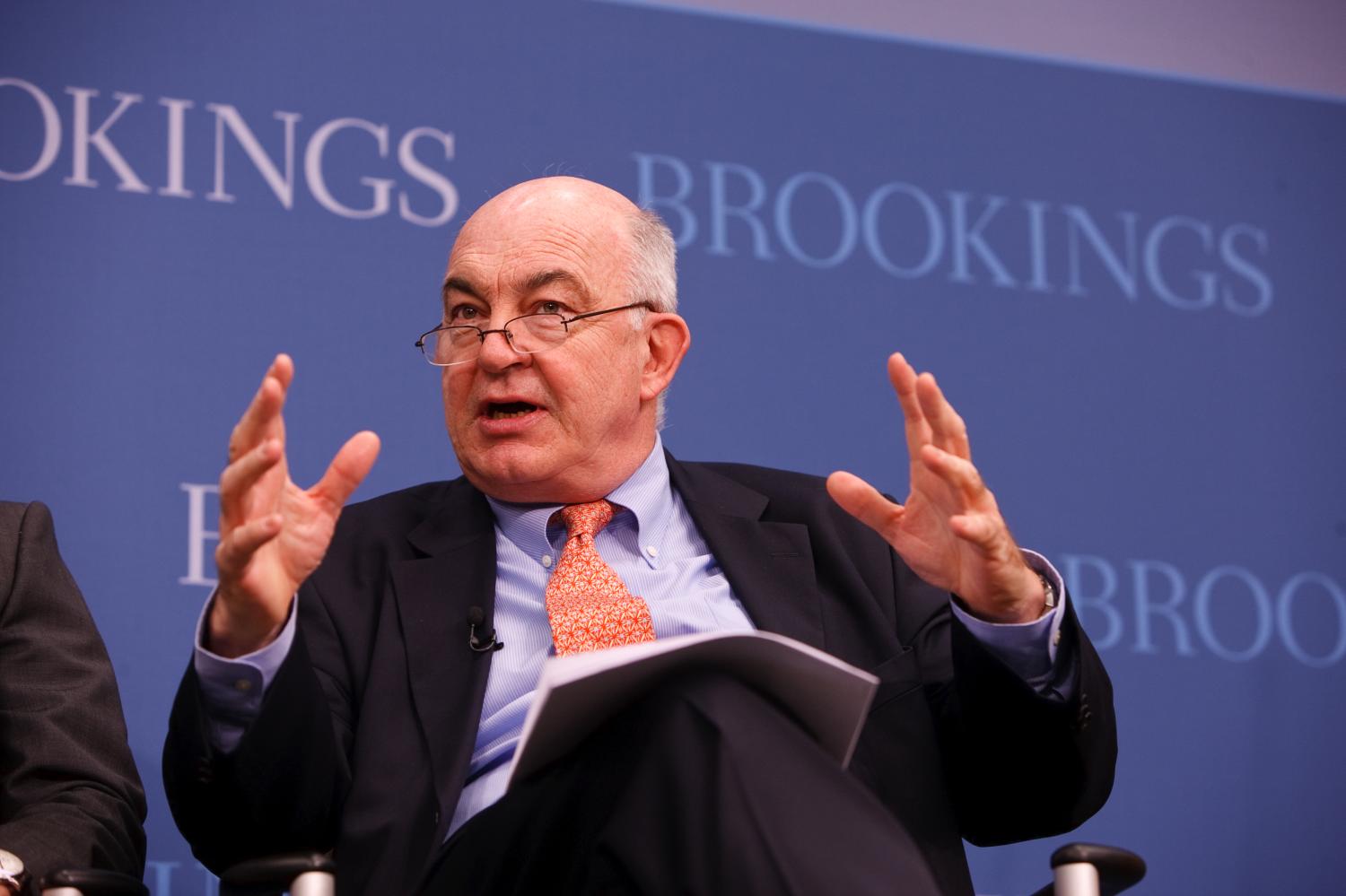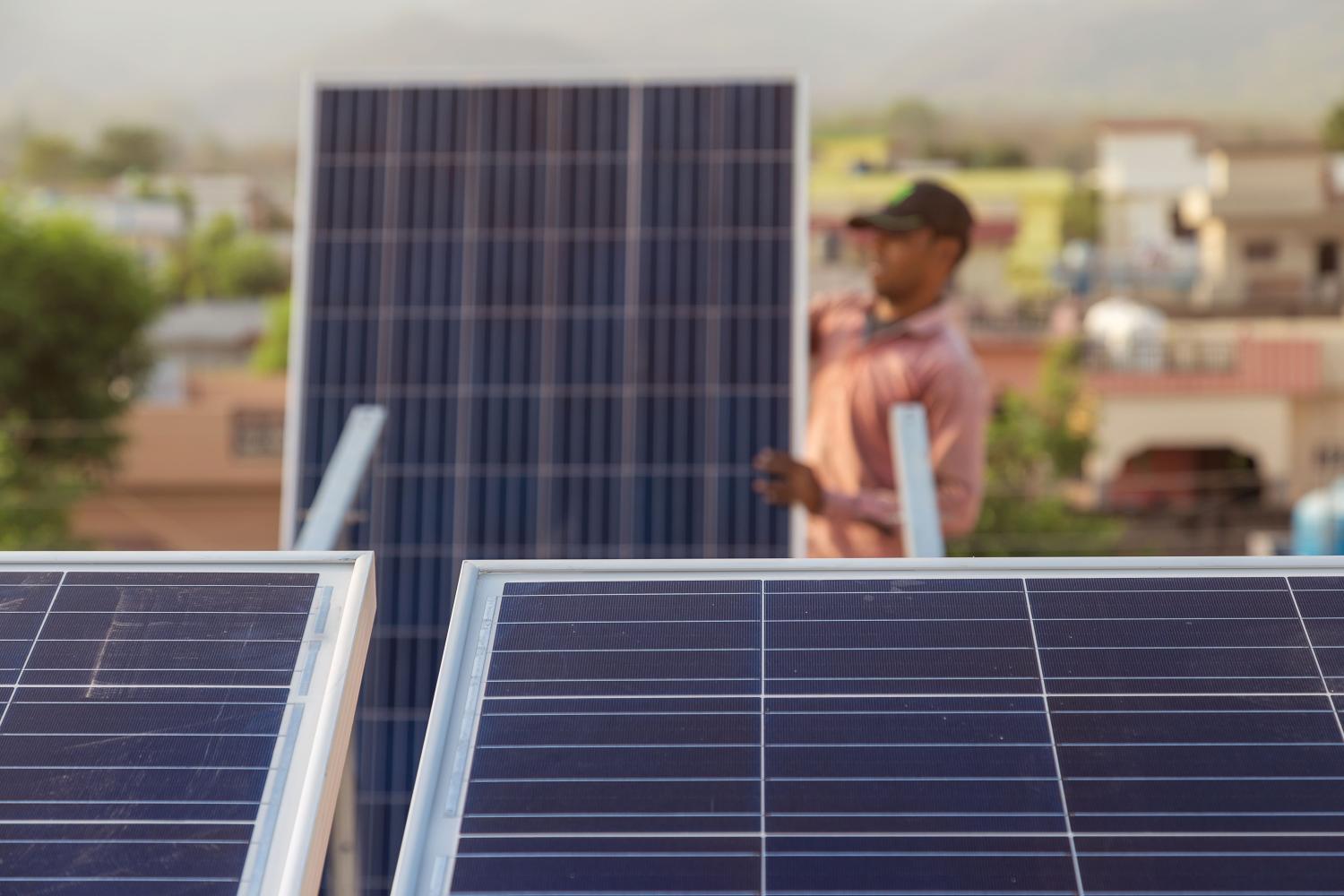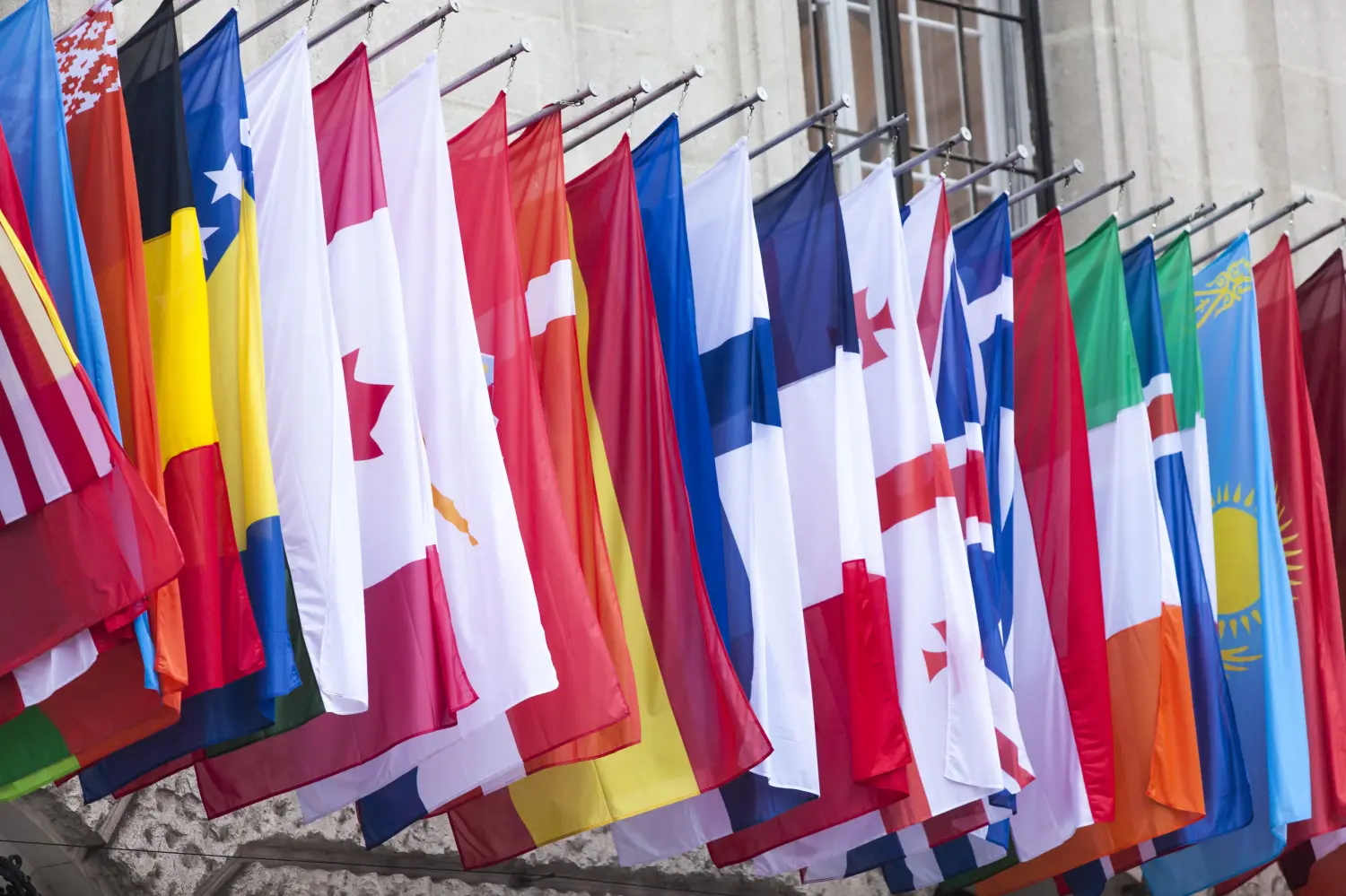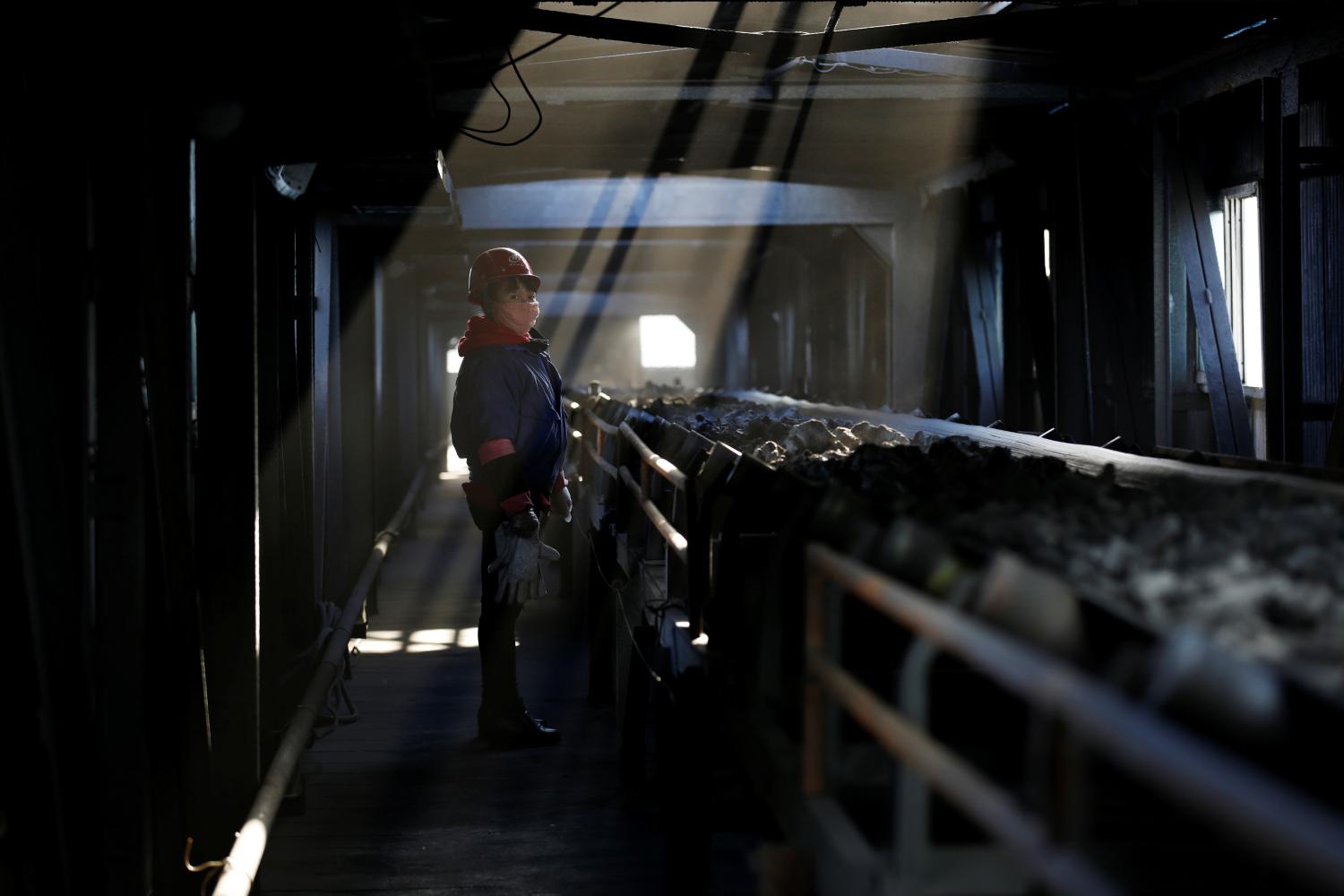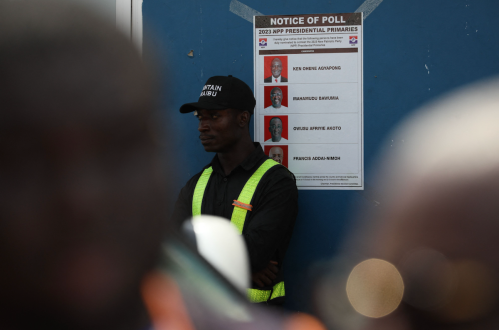There is no single view or ideology at Brookings, the patriotism I have observed is not of the 'nationalistic' type but reflects a predominant conviction that American excellence benefits the whole world and, that in a deep and long-term sense, global progress is a positive sum game, where progress in one country has a positive impact on others.
Kemal Derviş
In memory of Kemal Derviş, 1949-2023
A message from the vice president and director
It is with great sadness we received the news that Kemal Derviş passed away on May 7 following a lengthy illness. Kemal was my predecessor and led the Global Economy and Development program at Brookings from April 2009 to November 2017. He is survived by his wife Catherine and two sons Erdal and Erol.
Kemal’s passing leaves an irreplaceable void in the realm of economics and public service. But his legacy endures. In many ways, Kemal represented and modeled the transformative power of knowledge and compassion, and he was steadfastly dedicated to creating a better world for all. His influential publications, innovative ideas, and policy recommendations provided invaluable guidance to policymakers, economists, and thought leaders around the world.
As vice president of the Global program, Kemal exemplified the institution’s commitment to excellence, intellectual rigor, and public engagement. He played a pivotal role in fostering a collaborative and interdisciplinary environment within the program and bringing together diverse voices and perspectives to tackle complex policy challenges. His unwavering belief in the power of informed debate, evidence-based research, and constructive dialogue propelled Global and Brookings to new heights in terms of influence and impact.
Kemal was also renowned for his charismatic leadership and dedication to his values. He nurtured a spirit of openness, inclusivity, and intellectual curiosity, inspiring colleagues and fostering a truly vibrant intellectual community. As a mentor to young scholars and researchers, he was committed to shaping the next generation of leaders and thinkers. Everyone Kemal has worked with—from former research assistants to the many colleagues who joined our program because of him to the former managing director of the World Bank—remember him as a true mentor.
Kemal’s legacy at Brookings extends beyond his official roles. His presence was felt in the corridors, meeting rooms, and gatherings, where his infectious enthusiasm, warm demeanor, and genuine interest in the work of others left an indelible mark. He was a beacon of inspiration and encouragement, always willing to lend a helping hand, offer wise advice, and champion new ideas. His intellectual brilliance and commitment to advancing knowledge and fostering positive change will continue to reverberate through the halls of Brookings and beyond.
Kemal had an extraordinary career well before he came to Brookings. He started his career as a professor at Princeton University where he was a pioneer on general equilibrium modeling for development policy. He joined the World Bank in 1978, and spent the next 22 years there, with his last position as vice president of poverty reduction and economic management. He was considered among the finest economists in the Bank and had major development impact including on the peace process and reconstruction of Bosnia, economic transformation of Eastern Europe, and tackling development challenges in the Middle East and North Africa.
In 2001, he was appointed by the prime minister of Turkey as the minister of economic affairs and the treasury to take on the challenging task of rescuing Turkey from the most severe crisis that it had faced. He used the opportunity to shape courageous and transformational reforms, whose legacy endures today. Since then, he has been among the most admired leaders in Turkey for his integrity and deep commitment to his country.
In 2005, he was appointed by Kofi Annan as the head of the U.N. Development Program where he helped strengthen its development impact and leadership on the global agenda including on human development and climate.
As we bid farewell, let us celebrate Kemal’s enduring legacy by carrying forward his spirit by embracing the principles he held dear: fairness, equality, and the pursuit of a more prosperous and inclusive society. Let us also carry forward his passion for economic justice, sustainable development, and the power of knowledge. It is in this spirit that my colleagues and I produced this collection of essays on some of the topics that Kemal cared deeply about, including climate, multilateralism and global governance, and technology, productivity, and inequality.
Brahima S. Coulibaly
Vice President and Director, Global Economy and Development, Brookings

The race to realize a net-zero world by 2050 remains tight, with different groups of countries moving at varying speeds. But it is becoming increasingly clear that the performance of emerging markets and developing economies other than China is likely to hold the key to success.
Kemal Derviş and Sebastian Strauss
1. The threat of climate change
Amar Bhattacharya | Senior Fellow, Center for Sustainable Development, Global Economy and Development, Brookings
Kemal Derviş was a pioneer in his understanding of and in his contributions to tackling the threat of climate change. In 2007, as the head of the U.N. Development Programme, he initiated and oversaw the U.N. Human Development Report devoted to climate change, just a year after the milestone Stern Review.1 The report argued that climate change was the defining human development challenge of the 21st century and set out a farsighted agenda on climate action.
Since then, the pace of climate change has accelerated and with it the evident impacts and mounting costs across the world. It has therefore become perhaps the most important challenge for global collective action. Climate action is an archetypical and aggregate global public good since the reduction of greenhouse gas concentrations in the atmosphere achieved by mitigation in one country does not impinge on the amounts affecting any other country, and it is emissions everywhere that determine global emissions. It has also acquired an ethical dimension given the moral responsibility to protect the future of the planet and given that the impact will fall on highly vulnerable populations that have contributed the least to the problem.
Kemal recognized that the narrative on climate change has changed profoundly, from a constraint to growth and a burden-sharing challenge to an opportunity for new and better forms of growth.2 Technological change has made green technologies more competitive, there are exciting prospects for further innovation, and we recognize much more clearly the co-benefits of climate action from clean air to robust ecosystems as well as the costs associated with the harmful and polluting models of past growth.
While it is thus in the self-interest of countries, private companies, and individuals to shift to low-carbon alternatives, the pace of change is unlikely to be sufficient given vested interests, that it may still be financially more profitable to use existing assets because of sunk costs, and the lack of finance to pursue aggressive transformation. The latest report of the Intergovernmental Panel on Climate Change (IPCC) shows that the next decade will be crucial to whether the world can stay close to the target of 1.5 degrees Celsius in global warming, beyond which we face prospects of catastrophic risks.
Kemal was therefore a strong proponent of much more forceful action on carbon pricing and other regulatory measures to accelerate the shift to low-carbon growth. He also recognized the need to ensure a just transition as the shift to a green economy would produce both winners and losers, and that particular attention had to be given to the employment impacts of the green transition. The third imperative is the need for a large amount of long-term development finance to support low-carbon transition and climate resilience in developing countries not only for equity reasons but also because these countries together would account for the bulk of future of global carbon dioxide
emissions.
Climate action requires strong international coordination and mutually binding commitments, but the formal negotiation process under the U.N. Framework Convention on Climate Change (UNFCCC) has been mired in a lack of trust and the excessive influence of those opposed to change. Consequently, Kemal argued for “polylateralism” using all possible avenues to advance climate action including the private sector and civil society. As he wrote in his final essay on climate change: “Strong links must be forged between country strategies and preferences and multilateral cooperation. Climate must also be mainstreamed into key decisionmaking processes, such as the G20 and G7, although the U.N. should continue to play a leading role precisely because the issue is universal.”3
2. Kemal Derviş: A realist and an optimist on climate change
Nancy Birdsall | Senior Fellow and President Emeritus, Center for Global Development
Kemal Derviş may well be best known as the economist who brought the rare combination of macro-economic understanding and political savvy to save his country, Turkey, from a meltdown of its currency and its economy in 2001. Yet in fact his vision and his contributions were global in scope and persistent in their focus on the world’s poor; he wanted “A Better Globalization” (the title of his 2007 book) that would bring greater legitimacy to the system of global governance and greater voice and resources for poor countries and their peoples.
His speeches, essays, and blog posts on the global problem of climate change reflect a hopeful vision of global solidarity on a shared global challenge, in which economic policies and programs at the international level would necessarily include compensation for short-term losers across as well as within countries.
In 2007 he used his platform as head of the United Nations Development Program to write of the “devastating” impact of climate change on the world’s poor, “both because of geography and low income,” and to emphasize that for poor countries it is adaptation not mitigation that has to be the primary focus of funding—even as funding for adaptation initiatives then was “woefully inadequate” (and has remained so—on this he was prescient).4
Chosen to deliver the prestigious annual WIDER lecture (World Institute for Development Economics Research) in 2008, Derviş focused on climate change, despite admitting to being a “relative neophyte” on the topic. He covered the full range of topics, from global programs and policies to curb carbon emissions, with differential responsibilities between rich and poor countries, to a global system of carbon taxes (with border adjustment taxes), and an international cap-and-trade system. Throughout he insisted on the centrality of “distributional” concerns within as well as across countries, and speaking very much as the economist he was, underlined his concern that the current global economic system does not have mechanisms to adequately ensure that losers from global policy changes (poor countries and the poor within countries) are adequately compensated.
He also set out the logic of middle-income countries receiving concessional funds from the multilateral banks as the necessary incentive to cover the higher costs of switching to low- and no-carbon energy paths—a critical point only now, 15 years later, finally recognized and acknowledged in official discussions of multilateral assistance.
In the last five years, Derviş wrote a series of columns for Project Syndicate on climate change. Being a pragmatist as well as a visionary, he embraced Nicholas Stern’s argument that new low-cost “green” technologies mean that commercial gains can now drive progress on the climate issue. But he had caveats, reflecting his abiding concern for the world’s poor. Will developing countries have adequate access to the large amounts of long-term development finance they will need to make the transition from adequately capitalized multilateral banks? Will the worrying rise of nationalism in Western donor countries undermine any hopes for adequate compensation (with public money, presumably) to poor countries suffering severe “loss and damage” due to climate change? Or will a form of “planetary ethics,” as he put it, prevail?5
Derviş was a realist—he wrote recently about the threat to global progress on climate change of rising nationalist movements—and at the same time an optimist, seeing in the climate movement the rise of a powerful planetary ethics of global solidarity and responsibility.2 A better elucidator of the climate challenge the world faces, including for non-economists, would be hard to find.
3. We need a Green Bank to finance climate actions
Hafez Ghanem | Nonresident Senior Fellow, Global Economy and Development, Brookings
During the Summit on a New Global Financing Pact that took place in Paris on June 22-23, 2023, President William Ruto of Kenya argued for the creation of a new financial institution, an international Green Bank. I think that Kemal would have agreed with him.
Humanity is losing the battle against climate change. The United Nations Environment Program’s (UNEP) latest emission gap report indicates that the world is far from achieving the Paris Agreement’s goal of limiting global warming to well below 2 degrees Celsius.6 Policies currently in place point to a 2.8 degrees Celsius temperature rise by the end of the century.
The next few years are critical. Limiting warming to 1.5-2.0 degrees Celsius requires greenhouse gas emissions to peak before 2025, that is less than two years away. To meet climate goals, countries of the Global South (outside of China) will need to spend more than $1 trillion per year by 2025, and more than $2 trillion per year by 2030.7 It is hard to see how low- and middle-income countries can come up with those kinds of climate expenditures given other pressing needs in health, education, and infrastructure.
How will climate projects in the Global South be financed? The current political consensus in the Global North seems to be that we should ask the World Bank and other multilateral development banks (MDBs) to do it. Many in the Global South are skeptical for several reasons, including: (1) a focus on climate would draw resources away from the fight against poverty; (2) the MDBs current financial structure does not allow them to raise anything near the trillions that are required; and (3) most of the climate investments will need to be done by the private sector, and the MDBs are traditionally geared toward financing governments.
That is why it would make sense to let the MDBs continue to focus on fighting poverty, while creating a new “Green Bank”8 that would fund private-sector green projects.9 Green Bank governance should be different from that of existing MDBs. It should be a public-private partnership with an important voice for private actors. And countries of the Global South should have a voice equal to that of countries of the Global North.
This does not mean that climate and development should be de-linked. Clearly climate change impacts poverty and economic development. Under this proposal the World Bank would continue to take the lead in developing country strategies, including climate policies, and supporting country platforms. Green Bank would focus on raising green finance through green bonds, selling carbon credits and perhaps other innovative mechanisms, and developing and financing private-sector green projects. It would have to work in close partnership with the World Bank and other MDBs.
Cooperation among likeminded or geographically proximate countries should certainly be encouraged. But that is no substitute for global rules and standards that are required to confront the world’s existing and emerging challenges.
Kemal Derviş
4. Multilateralism and global governance in a fragmented world
Masood Ahmed | President, Center for Global Development
Globalization, multilateralism, and global governance were constant themes in Kemal Derviş’ work over two decades. This is not surprising since these were the dominant economic phenomena of the time, particularly after the fall of the Berlin Wall in 1989, which ushered in the “end of history.” The traditional debates between left and right and between state- or market-led economic strategies were overtaken by questions about how to promote the benefits of globalization, and how international rules would constrain national economic choices.
Alongside the cheerleaders for globalization, there were always voices noting that greater interdependence across nations and the stronger application of global norms and rules required a commensurate effort to modernize and democratize the institutions that made these rules—notably the World Trade Organization (WTO), the International Monetary Fund (IMF), the World Bank, and the U.N. Security Council. Derviş was a thoughtful, practical, and also optimistic voice among them. Whether in the heyday of globalization or amid the dark clouds of populist nationalism, he maintained a clear vision of why better and more representative global governance was not only essential to solve the world’s problems but was also the only way to ensure that multilateralism would thrive.
The Global Financial Crisis of 2008 marked the cresting of the wave of globalization. It accelerated questioning of both the policies that underpinned globalization and the institutions meant to manage its impacts. Communities left behind during a period of growing inequality grew distrustful of their own governments, who, in turn, found it convenient to pin the blame on global forces rather than their own economic policies and the inevitable reality of technological disruption. Populist governments, including in the United States, started to reject global rules and to pursue international deals that served their own best interest. In parallel, the sharpening rivalry between the United States and its allies on the one side and China on the other made it clear that far from ending, history had merely entered another chapter. Finally, the manifestly inadequate international response to the impact of the COVID-19 pandemic, and more recently, the food and fuel crisis caused by Russia’s war in Ukraine, severely damaged developing countries’ trust in the multilateral system. Discussions of multilateralism increasingly focus on whether it can be saved at all.
My view is that the rules and functioning of multilateralism in its current form are inadequate and will become even more so as the world tackles emerging global challenges. However, I also believe that these challenges can only be solved through some form of international cooperation. How to proceed? To start, we must accept that the conditions for agreement on a comprehensive new multilateral order are missing. For the coming decade, at least, we must focus on creating customized multilateral arrangements where needs are most urgent and muddling through elsewhere. Among the urgent challenges are the obvious ones of climate change, artificial intelligence, pandemic prevention, and macroeconomic and financial stability. For these, we need to focus on the core group of countries whose cooperation is essential. In all cases, that will include both China and the United States, so the first order of business is for the two largest economies to find a way to cooperate on shared challenges. But beyond these two largest economies, the participation of different groupings of advanced and emerging economies and low-income countries will be needed depending on the issue being tackled.
Pragmatic multilateralism is the right approach in a fragmented world, but we should recognize its limitations. As Kemal Derviş wrote in 2019, “Cooperation among likeminded or geographically proximate countries should certainly be encouraged. But that is no substitute for global rules and standards that are required to confront the world’s existing and emerging challenges.”10 So, while working pragmatically for the near term, we must keep our eyes firmly on the prize of the ideal multilateralism that must follow.
5. Inclusive governance in multilateral institutions is important for legitimacy and efficacy
Brahima S. Coulibaly | Vice President and Director, Global Economy and Development, Brookings
The current debate on global governance, particularly the governance structure of multilateral institutions, would have drawn strong interest and contributions from Kemal Derviş. He was a firm believer in the power of multilateralism for addressing global challenges and providing global public goods. The current multilateral system, which was set up after World War II, has laid a strong foundation for global governance. However, growing political discontent with globalization has been associated with the failure of the multilateral system to stem the tide of rising inequality, social fragmentation, and job insecurity in relation to technological change and offshoring in advanced countries. He often noted these imperfections in the current multilateral system. He was particularly sensitive to the inclusion, representation, and voice of the Global South. In fact Kemal’s last major project, a collection of essays that he co-edited with me, was entitled “Essays on a 21st century multilateralism that works for all.”11
Kemal recognized that the governance structure is critical for both the legitimacy and effectiveness of any multilateral organization. The main challenge is to find a governance structure that reconciles interests of sovereign nations that vary widely. The guiding framework for achieving this feat was outlined in another essay he co-authored with me on “The governance of the International Monetary Fund at age 75.”12 He believed that the governance at any legitimate institution should recognize and reflect the following three realities: First, it should recognize the sovereign nation-states or nationhood, meaning equal treatment for all sovereign nations regardless of their economic size or population. Second, it should recognize and reflect different population sizes of the sovereign nation-states. This belief is rooted in the ultimate goal of achieving shared prosperity for all people. Third, it should recognize different national capacities and resources. The latter criterion is more out of pragmatism than anything else. Kemal believed that unless nations with more resources were comfortable with their role in the governance structure, the multilateral institution could be underfunded. Once these three realities are considered, the key challenge becomes their relative importance in the governance structure and achieving the right balance.
With the 16th quota review of the International Monetary Fund (IMF) coming up later this year, Kemal would have evaluated the institution’s governance structure against this framework. The basic votes at the IMF, which are the same for every nation, large or small, satisfy the nationhood reality; the calculated quotas, which are based on economic and financial variables, capture economic size and capacities; and the purchasing power parity portion of the GDP blend in the quota formula provides an imperfect proxy for population.
Although the IMF’s governance structure more or less encompasses the three pillars of his preferred governance framework, Kemal would have advocated for greater importance of population in the calculation of quotas and for the allocation of more quotas to emerging market and developing countries (EMDEs) in line with the relative increase in their economic and financial importance. The latter could be achieved by realigning actual and calculated quotas, which would bolster transparency and legitimacy. The emphasis on increasing quotas for EMDEs and giving more importance to population size reflects the broader beliefs that Kemal had in the benefits of inclusion. To him it was not just a matter of fairness—it was the only way to achieve shared prosperity and global peace and stability.
6. Strengthening the transatlantic relationship in a multipolar world
Domenico Lombardi | Director, Policy Observatory, Luiss University, Rome
For those who have believed in, and advocated for, better global governance, the last few years have come with stark disappointment.
The Russian aggression toward Ukraine has accelerated a fragmentation of the world economy, by igniting a sanctions regime that is unprecedented in scope and depth. It has triggered a rethinking of energy policies in European countries once heavily dependent on Russian gas and oil and has led to a push for broader and faster transition toward decarbonization. Uncertainty surrounding the future regime of trade and investment flows has increased.
At the same time, the relationship between the U.S. and China has turned increasingly antagonistic. Moreover, China and Russia, both fearing that any reform of the multilateral system would jeopardize their status, are blocking attempts at such reform.
Overall, it is likely that we will have to wait a bit longer for the better world envisioned by Kemal Derviş. Yet, we should not despair.
Indeed, world democracies have shown unusual resilience in the face of unforeseen challenges and unprecedented resolve against autocratic regimes no matter the consequences. In Europe, this has meant, among other things, accepting the near prospect of energy rationing due to the skyrocketing of gas prices.
Looking ahead, the challenge for the world economy lies in the regime that will eventually govern commercial and investment flows between democratic nations on the one hand, and China and its associates, including Russia, on the other.
The U.S. administration is trying to develop a two-track regime that would discriminate between subsectors or subproducts that have national security implications and those that do not. Implicit in that vision is the awareness that we cannot roll back the full scale of a globally integrated economy with its vast benefits.
I see at least two challenges in the sustainability of this regime in relation to how economic competition between and within blocs will eventually materialize. In the first instance, sanctions are typically applied against trade or investment flows originating from one bloc to the other. The challenge, however, is in implementation. Recently, an important Netherlands-based tech company was prevented from selling to China due to national security concerns. In contrast, another large company, this time in Germany, was reported by the press to have exported its dual-use technology to China. Accordingly, countries able to project relative geopolitical autonomy have been able to carve a larger perimeter of autonomy for their companies through a strategic use of the sanctions regime.
The other challenge points to competition purely within the Western bloc through active industrial policies that undermine a level playing field. The recent Inflation Reduction Act in the U.S. is a case in point, subsidizing European investments in U.S. manufacturing while discriminating against imported materials because no formal trade agreement exists between the U.S. and the EU.
In the future, the constraints of the new regime are set to increase, for example by scrutinizing outbound investment to China, not just inbound investment from China. So too, will incentives increase to bend the regime in one country’s favor over another’s.
The only workable option is to devise a more sustainable distribution of costs and benefits within the Western bloc. For instance, there is progress on sharing the costs of the intense military and strategic cooperation within Europe and the U.S. within the framework of NATO. That said, cooperation cannot be defined only on those terms; nor can Washington ask export-driven economies like Germany to simply curb their exports to China. It is high time to discuss the scope of, and to improve on, cooperation across the Atlantic. It is a goal that would undoubtedly have been close to Kemal’s heart, that of bridging the two continents that he so loved by enhancing and better structuring the relationship between them.
7. Europe’s future, Europe’s challenges
Jacques Mistral | Former Economic Adviser to the French Prime Minister; Visiting Professor, Harvard Kennedy School
Many, in 2012, and not only The Economist’s columnists, believed that Europe was falling into irrelevance or even oblivion. Not Kemal Derviş, who always had a strong vision of Europe’s future. Facing the dramatic debt crisis in the eurozone, he launched a far-reaching Brookings project to provide new perspectives on the future of what was and remains the most ambitious experience in international governance in history.13 The resulting book proved right, at least in its more important conclusion: The debt crisis proved a defining moment reinforcing the impetus to build a closer union. And what a difference the last 10 years has made! The European Union successfully faced a series of powerful shocks. The most dangerous challenge was the decision of the British voters in 2016 to leave the union; many then expressed the view that this democratic, unexpected, and radical choice would spread like wildfire on the continent. The result was the opposite. The European governments have demonstrated an unwavering cohesion, and the populace measured in concrete terms the risks of the exit strategy.
Frexit, which appeared in the 2017 French presidential election as a serious policy option, disappeared in the 2022 campaign. Increasing migratory movements as well as the COVID-19 crisis subsequently fueled populist reactions; for sure, tensions frequently grew between Central and Western European countries but didn’t lead to political withdrawals. Despite an undeniable rise of the extreme right, the elections of the European Parliament in 2019 demonstrated a new interest of the electorate for democracy at the European level. All this proves the European institutions’ increased robustness. The European Council (heads of state and governments) is the clearly identified political decisionmaking body, the European Parliament (legislative body) is the seat of an increasingly vibrant European democracy, and the European Commission (executive branch of the European Union) has been internally and internationally reinforced in its traditional role as the administrative branch—see European Commission President Ursula von der Leyen’s recent visit to Chinese President Xi Jinping in company of the French President Emmanuel Macron.
The Ukrainian war in this respect adds a widespread sentiment of urgency: The European way is under the threat of autocratic regimes. East and Central European countries from Latvia to Romania are considered a common front line, and defense policy has been, for the first time, elevated much higher in the political agenda (e.g., the evolving German policy). On the economic side, no one disputes the fact that the ongoing digital and environmental revolutions are formidable challenges requiring massive and sustained research and investment programs. Success will come as a result of an appropriate mix of incentives and constraints and public funding and regulatory standards. The U.S. and the EU have in this regard entered into a renewed competition: America betting on innovation and flexibility backed by a huge public subsidy and Europe designing ambitious environmental goals and working to win back industrial sovereignty.
The war on the old continent and the fight for global supremacy between the U.S. and China clearly show that the EU has more than ever to act strategically. It is frequently observed that recurrent European crises have been the engine of a more and more integrated union; a world of deep disorder is simultaneously a challenge and an opportunity.
8. Multilateralism during economic warfare
Galip Kemal Özhan | Senior Economist, Bank of Canada
I am writing this piece for a special report in memory of Kemal Derviş during a challenging time for global economic integration.14 Kemal was an ardent advocate of multilateralism. His last piece in Project Syndicate is about the consequences of the Ukraine war. In this short essay, I am going to touch on several issues that he challenged us to ponder further.
It has been more than 16 months since Russia’s large-scale invasion of Ukraine, and the outcome of the war remains uncertain. In these challenging times, the distinction between ends and means becomes blurry. The ultimate objective of the West is to establish an inclusive, rules-based international system and undermine autocracies. In generating this outcome, the way that the West interacts with Russia—both during and after the war—requires global cooperation.
Western governments imposed various economic sanctions on the Russian economy to help Ukraine by means of economic warfare. However, sanctions act as a double-edged sword. While they might weaken domestic support for President Vladimir Putin and unravel his political coalitions, they also harm the Russian people and damage public opinion against the West and its values—which would further political divisions. Hence, sanctions should be designed in a way that hurts Putin’s regime while limiting the burden on Russian people. International cooperation is a crucial element in achieving this outcome.
The impact of sanctions can be strengthened if the West can diminish Russia’s capability to replace economic relationships with third countries. In a recent paper with Fabio Ghironi from the University of Washington and Daisoon Kim from North Carolina State University, we demonstrate this in a carefully calibrated three-region economic model.15 The impact on the Russian economy, in terms of the drop in aggregate consumption, is almost doubled when sanctions are introduced multilaterally. However, in our simulations, third countries always suffer from joining the sanctions, and there should be additional economic incentives to convince them to participate.
While the vision of a desirable world order contains strong appeals, self-interest drives much of international cooperation. The West can offer roles to third countries in the post-war reconstruction of Ukraine to generate cooperation. For instance, there can be assurances that there will not be any fall in the amount of international aid when resources are being spent on rebuilding Ukraine. Another example is that the Global South can be invited to conferences that discuss the post-war recovery, such as the London Conference on Ukraine Recovery.16 The West can benefit from these countries’ experience of engagements in other post-Soviet countries.
The success of sanctions depends also on whether the burden on Russian people can be mitigated to some level by additional policy actions. Easing the conditions for those who are trying to leave and assuring employment opportunities are among the examples that would provide incentives to side with the West. In providing these opportunities, collaboration with third countries would relieve the burden on the Western governments and help them to promote the inclusive, rules-based international system.
9. The journey to a new multilateral system
Vera Songwe | Nonresident Senior Fellow, Africa Growth Initiative, Global Economy and Development, Brookings
I recall Kemal was softer spoken than most of the other vice presidents of the World Bank, but with a deep understanding of history and geopolitics, and always looking for the opportunity to build. He always believed in the multilateral world order. Two decades since that time, Kemal still believed in it, but was more aware of its shortcomings and the need for a “multilateralism 2.0.”
Multilateral structures born out of the Second World War have served the world well. They helped Europe rebuild after the war, supported the developing world and Eastern Europe to integrate into the world economy in an orderly manner, and helped to lift many out of poverty, including in China.
However, as the polycrisis of the COVID-19 pandemic, rise in cost of living, climate, and conflict unleashed their heavy tolls on economies and people around the world, the near paralysis of multilateral institutions to offer a collective, timely, and adequate response—WHO on COVID-19, the G20/IMF on debt and inflation, UNFCCC on climate, and the United Nations/NATO on the war in Ukraine—has exposed the system’s weaknesses. Should we give up on multilateralism and create a new system? Or should we fix what we have?
Reforming the global governance chessboard, however, has proven a more contested battle precisely due to the polycrisis. China’s dominance of critical global supply chains has led to a reshaping of trade relations with the U.S. The increase in oil prices has given the Gulf Cooperation Council (GCC) states more voice in world politics, the Russia-Ukraine conflict has strengthened the voice of Turkey in NATO, and the climate crisis has emboldened the Global South. These new power dynamics have complicated the call for a new global order. But they could also help accelerate change for the better, with more countries contributing to the shape, form, and rules-based structure of an improved system.
The need for additional resources to achieve the Sustainable Development Goals (SDGs) and to keep the planet from getting past 1.5 degrees is top of mind for all treasuries and development professionals. A new multilateral architecture that ushers in more collaboration and coordination among countries and allows the system to increase, pool, and distribute resources using updated and more representative criteria could see more funds allocated for development.
The transaction cost of creating a new system is onerous, and many new and emerging powers agree that working within the existing systems is optimal; however, the system must be reformed for more voice and representation and better burden sharing. The Bridgetown Initiative demonstrates there is a way to transform and build a new global architecture.
The multiple crises continue to take a toll on many economies, but if this results in the creation of platforms to contest the present order and help build a more robust global governance and financial system, it may have been a road worth traveling.
A growth strategy that doesn’t work for all members of an economy is incomplete and unsustainable, no matter how much redistribution there may be. The definition of economic success must therefore include the extent to which growth is inclusive. Inclusiveness cannot be an afterthought.
Kemal Derviş and Laurence Chandy
10. The imperative of responsible and inclusive globalization
Dany Bahar | Nonresident Senior Fellow, Global Economy and Development, Brookings
When Kemal recruited me to Brookings, he was working on one of the biggest questions of all time: What is behind the productivity slowdown that advanced economies have experienced over the past decades? He invited me to join the team that was aiming to bring new insights into those discussions. Kemal gave me a professional chance as a freshly minted Ph.D. graduate with little experience or published work, and for that I’m eternally grateful.
Kemal and I discussed the exciting research ideas surrounding these questions. As an impeccable scientist, he was genuinely curious to hear possible answers coming from diverse perspectives before forming his own opinions. When having these discussions, as I was getting to know Kemal, it impressed me how—after so many years in high-level positions outside academia throughout his formidable career—he mastered technical frameworks to think about these matters, even writing production functions on a board! Yet, his answers were formulated in a way that was not as abstract as a theoretical
model, but rather relevant for policy. That mix of rigor and policy relevance that Kemal formulated in every task, big or small, is what I believe every economist should aspire toward accomplishing.
In our joint project, I researched patterns of productivity dispersion in a dozen countries using a global firm-level dataset. I found evidence of productivity divergence for firms within a country and narrowly defined industries, with both low- and high-productivity firms growing at significantly faster rates than middle-productivity ones. This is what I called “The Middle Productivity Trap.”17 I argue that this pattern of divergence can explain the rising productivity dispersion that others have documented, and that in turn is correlated with slower aggregate productivity growth. I further found that this divergence is particularly prevalent among knowledge-intensive industries, suggesting that it responds to the difficulties in the diffusion of knowledge.
In the Brookings publication “Productive Equity: The Twin Challenges of Reviving
Productivity and Reducing Inequality” where Kemal and I were authors alongside other scholars, I discussed these findings.18 I provided frameworks to think about the importance of technological adoption for firms far from the productivity frontier, and the possible barriers they are facing today that are keeping them from achieving high productivity.
Yet, as Kemal rightly argued in his contribution to this volume, the policies to overcome productivity slowdown must have a global component.2 In his own words: “Global interdependence and spillover effects increasingly require national policies to be framed in a global context—intensifying the need for, and increasing potential rewards from, international cooperation. In a globalized world economy, rules of engagement at the international level, such as those governing international trade and investment and flows of skills and technology, matter more. So do arrangements for global economic governance.”
In essence, to the extent that the slowdown in productivity responds to a slow diffusion of knowledge across borders, the policy response is found in international cooperation—through policies to better manage trade, investment, and, I would add, migration. In essence, I’d argue, building on my learnings from Kemal’s work, that the role of policymakers when it comes to international flows is not only to minimize distortions that can affect local markets, but rather to maximize gains that relate to the diffusion of knowledge and technology. While it is challenging to expand on policies to further deepen globalization given the political climate, it is also imperative to think about a form of globalization that is responsible and inclusive and reduces global inequality through the diffusion of knowledge.
11. In memory of Kemal Derviş: Scholar, changemaker, and gentleman
Carol Graham | Senior Fellow, Economic Studies, Brookings
Kemal Derviş was a brilliant scholar, dedicated and gifted policymaker, and truly wonderful human being. He combined a rare mix of robust and creative economic analysis, policy relevance, and deep passion for issues of equity, human well-being, and democracy. He put that rare mix into practice throughout a rich and varied career, ranging from finance minister of Turkey, World Bank practitioner, academic professor, and director of the Global and Economy and Development program at Brookings. He was a leader, teacher, mentor, and passionate advocate for the issues he cared about.
I personally benefited tremendously from working with Kemal and hope that I also learned how to better achieve progress in those varied areas, which I also care deeply about. Kemal intuitively understood the linkages that must be made to ensure that economic progress results in some level of equity, the reduction of poverty, the betterment of population well-being, and democratic governance. He also understood, more than most people, how integrally linked the fates of both poor and rich countries are and how they are even more so because of the merging of global issues with technological progress, climate change, and the increasing integration of economies around the world, all issues which affect the well-being of people everywhere. As such, Kemal did not operate in silos; he worked with a range of people, places, and topics and had deep appreciation for the role of ideas and creativity in supporting that process.
Perhaps most noteworthy and admirable about Kemal was his sincere and deeply rooted kindness for all those people whose lives he touched. Even at the sunset of his career, as his health was fading, he pursued his passions, he fought for a better world, and he was kind and appreciative of those who worked for him and with him. Brookings is a stronger institution because of his time here, and we are all better citizens of the world because of knowing and learning from him.
Homi Kharas | Senior Fellow, Center for Sustainable Development, Global Economy and Development, Brookings
In 2010, a Social Protection Advisory group was convened by the International Labour Office and the World Health Organization to “provide guidance and enhance global advocacy on the conceptual and policy aspects of the social protection floor.”19 Chaired by future President of Chile Michelle Bachelet, this eminent group included Kemal Derviş, who at the time had already been the administrator of the United Nations Development Programme (UNDP), a minister in Turkey, and a senior official in the World Bank.
Kemal had been a long-standing advocate for social protection in his writings. He had elaborated on his thinking in writing for Project Syndicate, later collected in a series of essays on the global political economy.20 One common thread was the argument that, in any individual country, socially inclusive policies should be intertwined with other policies to deliver long-run growth. Absent inclusion, he believed that policymaking would lose its foundation in democratic institutions and become hostage to authoritarianism and populism. He became enormously excited when International Monetary Fund (IMF) research demonstrated that this belief was well grounded in empirical experience.21
A second thread was his view that solidarity across countries was necessary. This followed his recognition that providing social protection at a minimum acceptable level would be too expensive for many poor countries to afford without international assistance. It was also part of his view that global solidarity, expressed through such efforts, would help create the conditions for peace in the world. Here, Kemal was following in the tradition of John Maynard Keynes. Keynes viewed free trade as a key underpinning for peace, and famously argued against excessive war reparations as creating a level of social discord that could again threaten peace.22 Similarly, Kemal believed that global solidarity to promote a social floor would create conditions of respect between countries that could underpin peace.
Hence, when the Advisory Group report was issued in 2011, it was not surprising that it contained strong recommendations for basic minimum income guarantees and for universal access to affordable services of health, water and sanitation, education, food security, housing, and other national priorities.23 Governments agreed to put in place a global social floor in the Addis Ababa Action Agenda of 2015.24
Kemal’s contributions extended beyond his own writings to the institutionalization of thought within Brookings that his leadership has fostered. To carry on his tradition, colleagues at Brookings and myself now routinely measure and publish estimates of the amount of money that would be needed to lift everyone in the world above the extreme poverty threshold—roughly $100 billion,25 or less than 0.1 percent of global GDP. We have tried to demonstrate how elements of the social floor can be operationalized, specifically through cash transfer programs,26 through the “17 Rooms”27 work that is conducted every year. I had the opportunity to advance this thinking in the context of the post-2015 High Level Panel report28 that formed a basis for the negotiations of what has become the U.N.-brokered Sustainable Development Goals (SDGs). “Leave no one behind” has become a staple of the development lexicon, and is now a Brookings publication.29
Kemal continues to inspire his many friends and colleagues at Brookings and around the world. We will miss him but never forget him.
13. Growth and distribution dynamics in the digital age
Zia Qureshi | Senior Fellow, Global Economy and Development, Brookings
I first met Kemal in the 1980s on a tennis court at the IMF-World Bank Bretton Woods Recreation Center just outside Washington. I was at the IMF then and Kemal at the World Bank. That first encounter turned into an enduring association lasting almost four decades—as professional colleagues¸ personal friends, and, yes, tennis partners. I subsequently moved to the World Bank where I had many opportunities to engage closely with Kemal. And, upon retirement from the Bank, I followed Kemal to Brookings where he was then heading the Global Economy and Development program.
At Brookings, an important focus of my work has been research on how technology led by digital transformation is changing the dynamics of economic growth and distribution. Kemal was the inspiration behind that research. When I joined Brookings, Kemal had just started work on a project to analyze the technology-productivity-inequality nexus. He asked me to work with him and other colleagues on that project. Kemal was intrigued by the productivity paradox, particularly the slowdown in productivity growth in the U.S. and in major economies in general in recent decades even as new technologies boomed.30 Economic growth also slowed as the impulse from productivity, its key long-term driver, weakened.
Kemal was also concerned about the rise in economic inequality occurring in these economies over the same period.31 He saw the rise in inequality as an important factor contributing to the contemporaneous rise in social discontent, populist nationalism, and political polarization.
Our research, published in a report32 and several articles, analyzed the twin trends of slowing productivity and rising inequality, focusing particularly on the role of technological change. It found that two broad sets of factors contributed to these trends. The first relates to the nature of the new technologies. Their benefits in terms of higher productivity and profits have tended to be captured mostly by a small number of firms at the technological frontier in increasingly concentrated, winner-takes-all markets. And they have shifted labor demand away from low- to middle-level skills to higher-level, more sophisticated skills that are in scarcer supply. As a result, not only have the new technologies had limited impact in boosting productivity more broadly across economies, but they have also increased inequality. The second set of factors relates to public policy. As technology reshaped markets, business models, and work, public policy was slow to promote a wider dissemination of the new technologies and productive opportunities across firms and workers.
To better harness the potential of technological change to boost productivity and promote more robust and inclusive economic growth, the research spelled out a reform agenda spanning competition policy, regulation of digital markets, the innovation system, digital infrastructure, upskilling and reskilling of the workforce, social protection frameworks, and tax policies. Artificial intelligence and related advances that now promise to take the digital revolution to a whole new level reinforce the need for policymakers to step up action.
With his characteristic insight and vision, Kemal saw these issues early on. We owe him a debt of gratitude for inspiring, advancing, and enriching research to address them.
14. WANTED: Disruptive politics for the age of disruption
Sebastian Strauss | Senior Analyst, Global Macro, Office of the President, Eurasia Group
Note: This essay is based on the last substantive discussions I had with Kemal Derviş. The views expressed are largely Kemal’s. I am eternally grateful to my dear mentor and friend for the wisdom, knowledge, and love of mankind he so generously shared with me over the years.
The last three centuries have been an age of unparalleled material progress, followed by what Kemal Derviş called “human progress” and culminating in the emergence of a “world civilization” endowed with universal values and fundamental common aspirations.
Now, humanity is at the cusp of a new era. A coming wave of disruptive technologies poses potentially catastrophic, even existential, dangers. Existing sociopolitical institutions and ideologies are ill-prepared to manage these risks. Gradualism in the “superstructure” will not do; neither will dispassionate technocratic solutions. Radical institutional reforms undergirded by new and disruptive political ideologies are needed to meet the challenge.
Success breeds complacency
Extrapolation from the past is a powerful determinant of visions for the future. Three centuries of material and technological progress have made us believe that there is nothing that human reason and ingenuity can’t achieve, no technology that we can’t contain, no threat that we can’t prevail over. Belief in human progress runs deep.
This belief has lulled us into a false sense of security about the dangers that lie ahead.
Yet as the history of the Cold War shows, there have been many close calls in the past. Success was not predetermined. Time and again, extinction was narrowly avoided thanks only to the decency, sanity, and wisdom of a few individual leaders—and a big dose of luck.
Going forward, great men and good fortune won’t cut it anymore. New waves of disruptive technologies, especially artificial intelligence (AI) and biotechnology, are coming fast and wide, bringing with them tremendous destructive potential beyond the control of any one leader, government, or even group of governments. AI is especially dangerous because of its general-purpose nature, low barriers to entry, and near-zero marginal costs, all of which make proliferation the default and containment incredibly challenging.
A new era
Material and technological progress threaten to reverse centuries of human progress—and even to destroy humanity itself.
The transformations we are about to experience are greater in scope, scale, and speed than any we have ever witnessed before. As such, they must be addressed quickly, comprehensively, and on a global scale. Marginal fixes won’t do. The “weakest link” nature of these collective action problems means that even the most powerful nation-states won’t be able to ensure their security alone.
Truly radical reforms in national and global political institutions are needed. But the world is nowhere near ready to put in place the very intrusive and globally consensual controls that are required.
There are generally good reasons to support gradual, conservative, decentralized policy change undergirded by slow, bottom-up cultural change. Today, however, there is an urgency that makes radical and rapid reforms in the “superstructure” of our sociopolitical institutions necessary.
To meet the needs and realities of our new age, what we need is a “revolutionary spirit” that dispenses with long-standing assumptions and takes nothing for granted—whether it’s national borders and sovereignty, the global structure and balance of power, the scope of the social contract, the nature of political legitimacy, the limits of private property, or the very system of Westphalian, state-centric governance.
Technical and technocratic solutions will be effective and timely only insofar as a global, values-inspired narrative that unleashes a groundswell of emotion and passion in support of “disruptive politics” can be developed to overcome narrow and short-term interests. The internationalist credo that has formed around climate change does give room for some hope, but much more is needed encompassing many other domains.
Such is the size of the essential political challenge facing humanity at this critical juncture.
-
Acknowledgements and disclosures
This collection is dedicated to the memory of Brooke Shearer (1950-2009), a loyal friend of the Brookings Institution and a respected journalist, government official, and non-governmental leader. This special report focuses on global poverty and development issues related to Brooke Shearer’s work.
-
Footnotes
- “Human Development Report 2007/2008: United Nations Development Programme.” UNDP, 2008, www.undp.org/publications/human-development-report-2007/2008.
- Derviş, Kemal, et al. “The New Climate Narrative: By Kemal Derviş.” Project Syndicate, 7 June 2021, www.project-syndicate.org/commentary/green-transition-is-growth-opportunity-not-economic-burden-by-kemal-dervis-2021-06.
- Derviş, Kemal, Kenneth G. Lieberthal Mallie Prytherch, et al. “Essays on a 21st Century Multilateralism That Works for All.” Brookings, 16 Feb 2022, www.brookings.edu/articles/essays-on-a-21st-century-multilateralism-that-works-for-all/.
- Derviş, Kemal. “Devastating for the World’s Poor: Climate Change Threatens the Development Gains Already Achieved.” United Nations, United Nations, 2007, www.un.org/en/chronicle/article/devastating-worlds-poor-climate-change-threatens-development-gains-already-achieved.
- Derviş, Kemal. “When Climate Activism and Nationalism Collide: By Kemal Derviş.” Project Syndicate, 13 Jan. 2020, https://www.project-syndicate.org/commentary/climate-activism-nationalism-political-divide-by-kemal-dervis-2020-01.
- Environment, UN. “Emissions Gap Report 2022.” UNEP, 2022, www.unep.org/resources/emissions-gap-report-2022.
- Songwe, Vera, et al. “Finance for Climate Action: Scaling up Investment for Climate and Development.” Grantham Research Institute on Climate Change and the Environment, 6 Dec. 2022, www.lse.ac.uk/granthaminstitute/publication/finance-for-climate-action-scaling-up-investment-for-climate-and-development/.
- Ghanem, Hafez et al. “The World Needs a Green Bank.” Policy Center, 1 Feb. 2023, www.policycenter.ma/publications/world-needs-green-bank.
- Ghanem, Hafez. “8 Reasons to Support a New International Green Bank.” FinDevLab, 5 Sept. 2023, findevlab.org/a-new-international-green-bank-8-reasons-to-support/.
- Derviş, Kemal, j. von Hettlingen, et al. “A Fragmented Multilateralism? By Kemal Derviş.” Project Syndicate, 13 Sept. 2018, www.project-syndicate.org/commentary/multilateralism-trump-international-institutions-by-kemal-dervis-2018-09.
- Derviş, Kemal, Kenneth G. Lieberthal Mallie Prytherch, et al. “Essays on a 21st Century Multilateralism That Works for All.” Brookings, 16 Feb 2022, www.brookings.edu/articles/essays-on-a-21st-century-multilateralism-that-works-for-all/.
- Coulibaly, Brahima S, and Kemal Derviş. “The Governance of the International Monetary Fund at Age 75.” Brookings, 9 Mar. 2019, www.brookings.edu/articles/the-governance-of-the-international-monetary-fund-at-age-75/.
- Mistral, Jacques, et al. “Europe’s Crisis, Europe’s Future.” Brookings, 20 Aug. 2020, www.brookings.edu/books/europes-crisis-europes-future/.
- The views expressed in this essay are my own and do not necessarily represent those of the Bank of Canada’s Governing Council. The content is not related to the Bank’s economic outlook or to the direction of its monetary policy.
- Ghironi, Fabio, et al. “International Economic Sanctions and Third-Country Effects.” Bank of Canada, Bank of Canada, 23 Aug. 2023, www.bankofcanada.ca/2023/08/staff-working-paper-2023-46/.
- “Ukraine Recovery Conference – on 21-22 June 2023 – London, UK.” Ukraine Recovery Conference – On 21-22 June 2023 – London, UK, www.urc-international.com/. Accessed 22 Sept. 2023.
- Bahar, Dany. “The Middle Productivity Trap: Dynamics of Productivity Dispersion.” Economics Letters, North-Holland, 13 Mar. 2018, www.sciencedirect.com/science/article/abs/pii/S0165176518300843.
- Qureshi, Zia, et al. “Productive Equity: The Twin Challenges of Reviving Productivity and Reducing Inequality.” Brookings, 9 Mar. 2019, www.brookings.edu/articles/productive-equity-the-twin-challenges-of-reviving-productivity-and-reducing-inequality/.
- “Social Protection.” ILO | Social Protection Platform, 2010, www.social-protection.org/gimi/ShowWiki.action?id=1134.
- Derviş, Kemal. “Reflections on Progress | Brookings.” Brookings, 2016, www.brookings.edu/books/reflections-on-progress/.
- Ostry, Jonathan D, et al. “14 Redistribution, Inequality, and Growth – IMF.” IMF Staff Discussion Note, Feb. 2014, www.imf.org/external/pubs/ft/sdn/2014/sdn1402.pdf.
- Keynes. “The Economic Consequences of the Peace by John Maynard Keynes.” Project Gutenberg, 6 May 2005, www.gutenberg.org/ebooks/15776.
- Bachelet, Michelle. “Social Protection Floor for a Fair and Inclusive Globalization.” Social Protection Floor for a Fair and Inclusive Globalization, 27 Oct. 2011, www.ilo.org/global/publications/books/WCMS_165750/lang–en/index.htm.
- Addis Ababa Action Agenda of the Third International Conference on Financing for Development, 2015, sustainabledevelopment.un.org/content/documents/2051AAAA_Outcome.pdf.
- Hassinger-Das, Brenna, Katelyn Fletcher, and Atenea Rosado-Viurques Jennifer L. O’Donoghue. “A Purpose-Driven Fund to End Extreme Poverty by 2030.” Brookings, 5 Apr. 2023, www.brookings.edu/articles/a-purpose-driven-fund-to-end-extreme-poverty-by-2030/.
- Kharas, Homi, John W. McArthur, et al. “Accelerating Digital Cash Transfers to the World’s Poorest.” Brookings, 17 Feb. 2022, www.brookings.edu/articles/accelerating-digital-cash-transfers-to-the-worlds-poorest/.
- Bracken, Alexandra, John W. McArthur, et al. “17 Rooms.” Brookings, 28 June 2023, www.brookings.edu/projects/17-rooms/.
- “Report of the Secretary-General’s High-Level Panel of Eminent Persons on the Post-2015 Development Agenda Secretary-General.” United Nations, United Nations, www.un.org/sg/en/management/beyond2015.shtml. Accessed 22 Sept. 2023.
- Kharas, Homi, et al. “Leave No One Behind.” Brookings, 20 Oct. 2019, www.brookings.edu/books/leave-no-one-behind/.
- Derviş, Kemal, Roberto Jacobus, et al. “Probing the Productivity Paradox: By Kemal Derviş & Zia Qureshi.” Project Syndicate, 30 Aug. 2016, www.project-syndicate.org/commentary/productivity-growth-and-technological-innovation-by-kemal-dervis-and-zia-qureshi-2016-09.
- Dervis, Kemal, and Zia Qureshi. “Income Distribution within Countries: Rising Inequality.” Brookings, 9 Mar. 2016, www.brookings.edu/articles/income-distribution-within-countries-rising-inequality/.
- “Productive Equity – Brookings.” Brookings, 2019, www.brookings.edu/articles/productive-equity-the-twin-challenges-of-reviving-productivity-and-reducing-inequality/.
The Brookings Institution is committed to quality, independence, and impact.
We are supported by a diverse array of funders. In line with our values and policies, each Brookings publication represents the sole views of its author(s).
